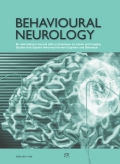Authors: Braun, C.M.J. | Montour-Proulx, I. | Daigneault, S. | Rouleau, I. | Kuehn, S. | Piskopos, M. | Desmarais, G. | Lussier, F. | Rainville, C.
Article Type:
Research Article
Abstract:
Neurologists and neuropsychologists are aware that aging men are more at risk than women for brain damage, principally because of the well known male-predominant risk for cardiovascular disease and related cerebrovascular accidents. However, a disproportion in prevalence of brain damage between the sexes in childhood may be less suspected. Furthermore, sex-specific risk for other aetiologies of brain damage may be little known, whether in the pediatric or adult populations. Proposals of a sex difference in cognitive
…recovery from brain damage have also been controversial. Six hundred and thirty five "consecutive" cases with cortical focal lesions including cases of all ages and both sexes were reviewed. Aetiology of the lesion was determined for each case as was postlesion IQ. Risk was highly male prevalent in all age groups, with a predominance of cardiovascular aetiology explaining much of the adult male prevalence. However, several other aetiological categories were significantly male prevalent in juveniles (mitotic, traumatic, dysplasic) and adults (mitotic, traumatic). There was no sex difference in outcome (i.e., postlesion IQ) of these cortical brain lesions for the cohort as a whole, after statistical removal of the influence of lesion extent, aetiology and presence of epilepsy. Mechanisms potentially responsible for sex differences in prevalence, aetiology of brain damage, and recovery, are reviewed and discussed.
Show more
Keywords: aetiology, lesion, brain, sex, sex difference, intelligence, recovery
Citation: Behavioural Neurology,
vol. 13, no. 3-4, pp. 105-116, 2000
Price: EUR 27.50





